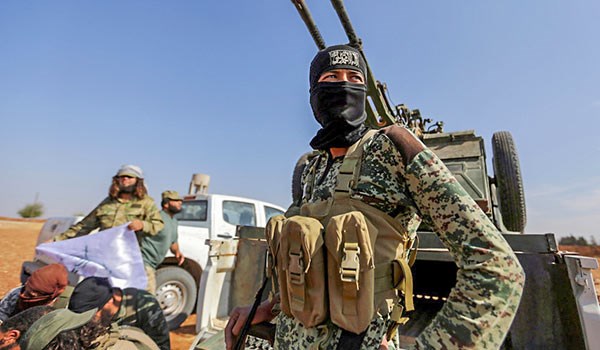
RNA - This is already happening in Syria. It’s a lose-lose for all: Syria, the region, and the world. The Trump White House and the Pentagon regime have made a policy of not bombing any ISIL forces caught trying to flee from their self-declared capital city of Raqqa and the surrounding area. The regime changers might be carrying out different bombing runs related to Raqqa; they might have even surrounded the city. But they have also left gaps to the south through which ISIL forces have been able to escape, with many apparently fleeing toward Palmyra and who knows where else.
On the other hand, Pentagon officials are hiking the US military “footprint” as well as “combat power” in southern Syria, sending more occupying troops into the area with a specific eye toward building military bases and fighting against the allied forces of Iran, Syria, Hezbollah and volunteer forces that are trying to advance, hoping to connect Syrian government territory to the Iraqi border.
As expected, volunteer forces who have been involved in the Mosul invasion in Iraq have been making for the Syrian border, looking to help the allied forces inside Syria with fighting ISIL. The problem is that US-backed terrorists are smack in the middle of these two sides, and the US has even targeted the allied forces inside Syria against international protocols to keep them away from the border region, accusing them of “threatening” the territory of its terror proxy forces.
This suggests the Pentagon regime is moving directly toward a military confrontation. That would be a problem for allied forces, as they are trying to mount an offensive toward the Iraq border, hoping to link up with volunteer forces planning to cross into Syria from the Iraqi side, and giving them a land route through which to do so.
That would be a problem for the international community as well, as Pentagon officials are used to looking for ISIL everywhere they can nowadays, and turn that into an excuse to stay and entertain. Mind you, they have just announced they found a security threat from them in the Caribbean, where ISIL obviously isn’t a huge thing. They have even declared that “just a few of these nuts can cause an awful lot of trouble down in the Caribbean,” complaining many of the islands don’t have proper militaries, let alone something like the US military, a monster that intervenes globally and is accountable to no one.
In reality, the “threat” here is much less about the Caribbean nations not having a globe-hopping military, than that the US is making such a big deal about it to also open up another frontline in its bogus War on Terror. It’s the same type of permanent war that we all know is not expected to end in Syria anytime soon - with the Trump administration both determined to impose regime change and unconcerned by the obvious consequences.
If the world community doesn’t take action now, this permanent war will take place elsewhere, even in the Caribbean. To stop this, governments need to help Syria and its allies win the Real War on Terror. They also need to prohibit certain regional states which contribute to fueling the sectarian inferno. The world needs to act now.
Several helpful and inspiring practices are taking place in Syria which could be shared and scaled-up. Iran and Russia are cooperating to defeat ISIL and Al-Qaeda forces, which requires a shared global policy as well. With the support of the United States and NATO, several countries in the region sharing large borders with Syria and Iraq are jointly working with the US towards regime change aspects of the conflict that drive sectarian violence, terrorism and weak governance, leading to foreign exploitation and degradation of regional security and peace.
They are also seeking to ensure long after Syria has defeated ISIL and Al-Qaeda, their terror cells will stay and entertain – just like their American associates, which is essential to maintaining regional status quo and American imperium. These destructive efforts are taking place in a region where sectarianism is the pillar for Wahhabi ideology, particularly in the case of Saudi Arabia. After all, they have launched a dirty war on Yemen and several countries have committed to expanding it, including the United States and Britain.
UN member states, recognizing the key role that the Syrian conflict plays for their future security, are therefore expected to mainstream peace into their national and international security planning and talk on adopting the Syria-wide ceasefire, in particular the de-escalation zones agreement adopted by Iran, Russia and Turkey.
This is a security framework to foster peace in the access to, development of and sharing of global benefits from post-ISIL Syria, ensuring its reconstruction and sustainable development, as well as reinvesting in human development. Damascus and allies have pledged to protect the people of post-ISIL Syria from future terror attacks. But they can only succeed in their commitments if there are contributions made by national governments and civil society towards this humane goal.
Now is the time to help Syria and all lives that depend on it. The world needs to act now and stop gaming Syria, before the remnants of ISIL and Al-Qaeda disappear into the crowd. The successful military campaign by Iran and Russia shows what can be done by other countries working from the ground up, rather than top-down politics.
847/940